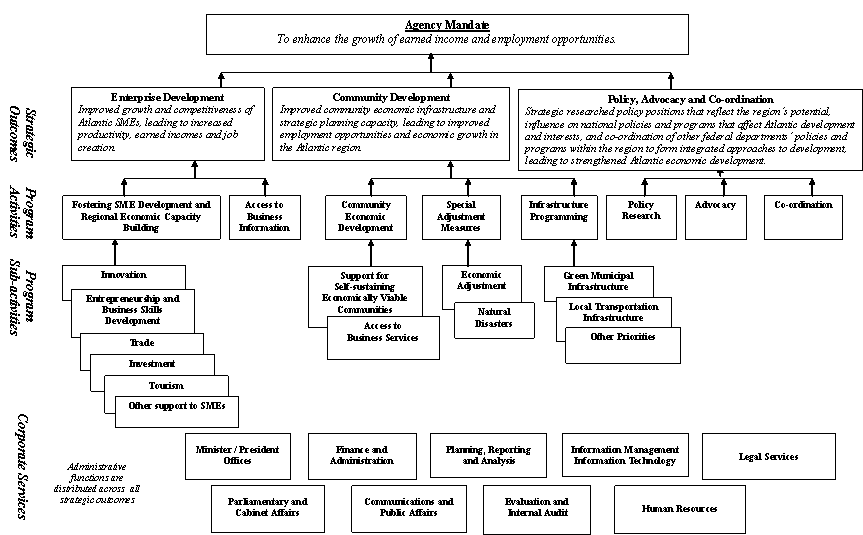Common menu bar links
Breadcrumb Trail
ARCHIVED - RPP 2006-2007
Atlantic Canada Opportunities Agency
 This page has been archived.
This page has been archived.
Archived Content
Information identified as archived on the Web is for reference, research or recordkeeping purposes. It has not been altered or updated after the date of archiving. Web pages that are archived on the Web are not subject to the Government of Canada Web Standards. As per the Communications Policy of the Government of Canada, you can request alternate formats on the "Contact Us" page.
Section I – Agency Overview
Minister's Message
As the government works to bring about real change, create opportunity and build a strong and united Canada, the Atlantic Canada Opportunities Agency has an important role to play. A strong Atlantic economy contributes to a strong Canada.
ACOA will continue to work within its economic development programs to focus on enterprise development, community development, and advocacy.
ACOA will work to maximize the impact of its investments in enterprise development by focusing on aiding the growth and competitiveness of small and medium-sized businesses. This means helping increase the productivity of individual businesses by targeting the development of areas such as innovation, skills and trade development.
ACOA will work with Atlantic universities, other government departments and the private sector on strategically-focused activities to promote innovation and commercialization. This is key to making Atlantic Canada more competitive overall, and creating attractive jobs that will help us retain our youth – the future of our region.
For almost to 20 years, ACOA has worked to increase opportunity for economic development in Canada's four Atlantic provinces, responding to economic and regional challenges in a strategic way, pooling resources, and bringing a regional perspective to national issues.
Strong communities, a dynamic economy,and opportunities for Atlantic Canadians – these are the priorities that guide the Agency as it works with its partners for the benefit of the Atlantic region and Canada.
|
____________________________________ |
Management Representation Statement
I submit for tabling in Parliament, the 2006-2007 Report on Plans and Priorities for the Atlantic Canada Opportunities Agency (ACOA).
This document has been prepared based on the reporting principles contained in the Guide for the Preparation of Part III of the 2006-2007 Estimates: Reports on Plans and Priorities and Departmental Performance Reports:
- It adheres to the specific reporting requirements outlined in the Treasury Board Secretariat guidance;
- It is based on the Agency's approved accountability structure as reflected in its Management Resources and Results Structure;
- It presents consistent, comprehensive, balanced and reliable information;
- It provides a basis of accountability for the results achieved with the resources and authorities entrusted to it
- It reports finances based on approved planned spending numbers from the Treasury Board Secretariat.
|
____________________________________ |
Changes in ACOA's Program Activity Architecture
Minor editorial changes have been made to ACOA's Program Activity Architecture since 2005-2006. These have been made solely for the purpose of more accurately reflecting the nature of the activities. No changes were made to the PAA structure.
2006-2007 Program Activity Architecture (changes are indicated in bold type)
|
Strategic Outcome |
Program Activity |
Program Sub-activity |
|
Enterprise Development |
Fostering SME Development and Regional Economic Capacity Building |
Innovation |
|
Entrepreneurship and Business Skills Development |
||
|
Trade |
||
|
Investment |
||
|
Tourism |
||
|
Other Support to SMEs |
||
|
Access to Business Information |
||
|
Community Development |
Community Economic Development |
|
|
Special Adjustment Measures |
||
|
Infrastructure Programming |
||
|
Policy, Advocacy and Co-ordination |
Policy Research |
|
|
Advocacy |
||
|
Co-ordination |
Summary Information
Raison d'être
|
2006-2007 |
2007-2008 |
2008-2009 |
|
|
Financial Resources ($ millions) |
380.4 |
348.7 |
321.8 |
|
Human Resources(FTEs) |
612 |
592 |
592 |
Strategic Outcomes
The Agency has three strategic outcomes that reflect its mandate of helping increase employment opportunities and earned income for Atlantic Canadians:
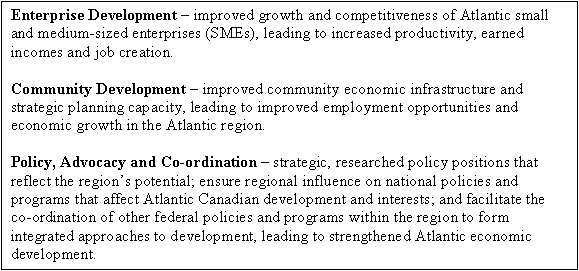
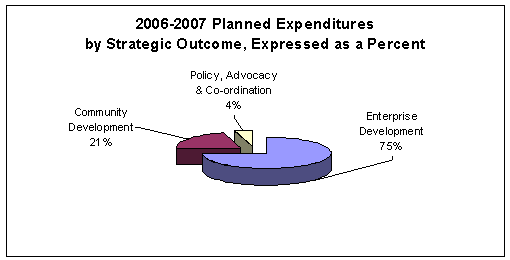
Operating Environment
ACOA is the arm of the federal government whose mission is to work in partnership with Atlantic Canadians to improve the economy of communities in the region. The Agency accomplishes this through a regional strategy that aims to improve economic performance and enhance the region's competitiveness. Working with partners in all orders of government, the private sector, academia and non-governmental organizations, ACOA seeks to advance economic opportunities and innovation in order to serve the needs of businesses, organizations, individuals and communities in Atlantic Canada.
Established in 1987, ACOA offers a broad range of programs and services designed to improve the climate for business growth. The Agency ensures that a wide variety of business development tools and resources are available to Atlantic entrepreneurs throughout all stages of the business life cycle, from the time they are thinking about setting up a new business, to the time they are planning for growth and expansion. ACOA is a federal agency with a difference; its mandate and organizational structure were determined following consultations with Atlantic Canadians from across the region. The result was that, for the first time, a federal organization charged with regional economic development in Atlantic Canada was headquartered in the Atlantic region.
The Agency takes an aggressive approach to identifying opportunities and overcoming regional barriers to growth, recognizing that an economy must have a number of conditions in place in order to succeed. It is felt that the Agency's broad-based approach to regional economic development addresses the underlying structural challenges in the economy in an effective and equitable manner.
At the national level, the Agency carries out this mandate by advocating for Atlantic Canada's interests, priorities and concerns in other federal government policy-making decisions and investments that have a direct impact on the Atlantic economy.
The Agency also participates in several horizontal initiatives. It is the lead department for Team Canada Atlantic and the International Business Development Program. In addition, the Agency is a partner on several horizontal initiatives led by other federal departments. More information on horizontal initiatives can be found in Section III, Table 8, of this report.
At the regional level, ACOA conducts policy research and analysis that helps provide the intellectual foundation for a comprehensive and strategic approach to regional development. Furthermore, the Agency plays a key role in co-ordinating pan-Atlantic development strategies, programs and initiatives, working closely with the provincial governments, Atlantic universities and research institutes, business organizations, other federal departments, and other stakeholders in the region to reduce duplication and maximize impact.
Locally, the Agency works with its partners to provide communities with the tools and resources they need to build more self-reliant local economies. Partnerships are a major element, not only in the delivery of programs and activities, but also in the development of programs and policies. ACOA partners with the private sector, universities, non-government organizations, as well as governments at all levels.
The Agency also works locally to improve the growth and competitiveness of Atlantic enterprises through a variety of programs and services designed to increase start-ups, expansions and modernizations.
Recognizing the growing correlation between innovation and productivity, Agency programs place emphasis on fostering research and development, technology adoption, skills development, and the improved access to capital required to make these kinds of investments in innovation possible. The Atlantic Innovation Fund continues to be a driving force behind the latest acceleration of Atlantic research and development. The Business Development Program and other ACOA programs are helping thousands of entrepreneurs to start up and expand businesses, optimize trade and export opportunities, develop new tourism products, and to improve business management practices to grow and compete in the global economy. These programs are strategically important. In the 1990s, 70% of the jobs created by new firms in Atlantic Canada were attributed to small businesses[1].
The Atlantic Investment Partnership – The Second Wave (AIP II) is a broad-based modern approach to economic development. This initiative will allow the Agency to build on the success of the first phase of the Atlantic Investment Partnership (AIP) in critical areas such as:
- Investing in Innovation - The Atlantic Innovation Fund will invest another $300 million in R&D projects in Atlantic Canada.
- Investing in Communities - The Innovative Communities Fund will invest $175 million in communities across Atlantic Canada.
- Investing in People - ACOA is investing $50 million in initiatives to foster entrepreneurship and business expansion, as well as focus on building, attracting and retaining skills in Atlantic Canada.
- Investing in the Business Climate - ACOA is investing $65 million in initiatives designed to improve the climate for business growth in Atlantic Canada.
[1] The State of Small Business and Entrepreneurship, Atlantic Canada – 2005, Atlantic Canada Opportunities Agency
Economic Environment
Following a gain of 1.4% in 2004, economic activity in Atlantic Canada improved in 2005, with real GDP increasing by 2.2%. Output in the goods-producing industries is estimated to have risen by 2% in 2005, led by a strong increase in mining, mainly iron ore production and the start-up of the Voisey's Bay mine. Activity in the construction sector weakened, as work on the White Rose and Voisey's Bay projects wound down. The services-producing industries registered good growth (2.4%) in 2005, with the exception of more moderate activity in business and personal services.
Atlantic Canada's labour market improved slightly in 2005 with employment up by 2,500. The unemployment rate fell from 10.7% in 2004 to 10.4%, reaching its lowest level in 30 years.
Foreign exports of commodities from Atlantic Canada rose by 5.3% during the first 10 months of 2005. With the exception of a large increase in the value of shipments of refined petroleum products (29.1%) due to higher energy prices, results for Atlantic Canada's major export products were mainly down in 2005. Total non-energy exports fell by 3.4%. The strong Canadian dollar, as well as a decline in production and demand for many products, contributed to the weak export performance.
Difficult market conditions exist for forestry products, as lower prices led to a decline in the value of exports of softwood lumber (-13.3%), and weak demand resulted in lower shipments of newsprint (-2.4%). The value of pulp exports also fell (-34.6%), mainly due to the closure of a mill in New Brunswick. Exports of fish products declined (-11%), due to lower shipments of crab products resulting from the late start to the fishery in Newfoundland and Labrador. Atlantic Canada's exports to the United States, the destination for over 80% of the region's foreign shipments of goods, increased by 3.8%.
The economy of Atlantic Canada is expected to strengthen further in 2006, led by a full year of production at both the Voisey's Bay mine and White Rose offshore oil field. The manufacturing sector should do well, while a slight decline is expected in the construction sector as work on major projects ended in 2005. The services-producing industries should register solid growth, led by gains in transportation, and personal and business services. Real GDP in Atlantic Canada is forecasted to increase by 3.1% in 2006, while employment is expected to rise by 1.9%.
The economy of Atlantic Canada has become much more diversified over the past few years, with new opportunities being pursued in the knowledge-based economy. This diversification is a result of the emergence of new high-technology sectors that are knowledge-intensive and export-oriented; the development of offshore oil and gas; and the establishment of new capacity for processing natural resources into value-added products.
The development of emerging sectors(e.g. information and communications technologies; biotechnology, life sciences and bioresources; aerospace and defence; advanced manufacturing; and marine technologies) underscores the progress that is being made in the region.
Factors Affecting Economic Performance
The outlook is generally positive, but there are a number of risk factors that could affect the economic outlook. These factors are largely external, relating to the volatility of oil prices as well as sustained global current account imbalances and potential weakness in key U.S. markets.
Consumer confidence could be affected further if oil prices continue to rise, leading to slower consumer spending and weaker economic growth. The large and persistent U.S. current account deficit could lead to further depreciation of the U.S. dollar against all major currencies, including the Canadian dollar. This would pose additional challenges for Canada's export sector.
The appreciation of the Canadian dollar since the end of 2002 has posed a challenge to Atlantic Canadian firms that are highly exposed to international trade. For example, employment in the region's manufacturing sector fell from 108,000 in 2004 to 99,000 in 2005 — a reduction of 9,000, or 8.3%.
There are a number of major social and economic challenges facing Atlantic Canada over the short and medium term. Slow or negative population growth, in conjunction with an aging population, will constrain future economic growth, particularly in rural areas. More effort will need to be placed on increasing immigration levels to ensure an adequate supply of labour.
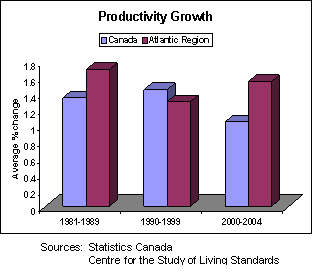 Structural changes to traditional
industries also continue to present adjustment challenges for Atlantic Canada's economy. Some fishery and
forestry-dependent communities face significant challenges in terms of finding alternative employment opportunities. In
addition, large industrial manufacturers must continue to adapt to higher energy costs for both the production and shipping of
products.
Structural changes to traditional
industries also continue to present adjustment challenges for Atlantic Canada's economy. Some fishery and
forestry-dependent communities face significant challenges in terms of finding alternative employment opportunities. In
addition, large industrial manufacturers must continue to adapt to higher energy costs for both the production and shipping of
products.
The region must continue to enhance its overall competitiveness as global competition intensifies, especially from countries such as China and India. In order to increase the region's competitiveness, there is a need to have sustained growth in productivity levels. Productivity growth in Atlantic Canada has performed relatively well in recent years; however, labour productivity is still only at 86% of the national level. For the region's manufacturing sector, labour productivity is at 76% of the national level.
In an effort to improve productivity, increased emphasis must be placed on encouraging companies to undertake more spending on research and development; acquire advanced technologies; invest in worker training and managerial skills; and become more export-oriented
Further information on specific challenges facing provinces can be found in Section IV.
Agency Plans and Priorities
Program Plans and Priorities
| Strategic Outcome Enterprise Development |
||
Expected Results:
|
||
|
Planned Spending and Full-time Equivalents (FTEs) |
||
|
2006-2007 |
2007-2008 |
2008-2009 |
|
$ 282.4 million 462 FTEs |
$ 262.0 million 440 FTEs |
$ 259.4 million 440 FTEs |
|
*Key Priorities: Client approach to enterprise development in collaboration with partners Proactive support to innovation Evaluate priorities on an ongoing basis to provide best possible support to clients |
||
|
Strategic Outcome Community Development |
||
|
Expected Results:
|
||
|
Planned Spending and Full-time Equivalents (FTEs) |
||
|
2006-2007 |
2007-2008 |
2008-2009 |
|
$81.2 million 86 FTEs |
$70.0 million 88 FTEs |
$45.7 million 88 FTEs |
|
*Key Priorities: Holistic approach to community development Facilitation of partner collaboration Capacity building Adjustment initiatives |
||
|
Strategic Outcome Policy, Advocacy and Co-ordination |
||
|
Expected Results:
|
||
|
Planned Spending and Full-time Equivalents (FTEs) |
||
|
2006-2007 |
2007-2008 |
2008-2009 |
|
$16.8 million 64 FTEs |
$16.7 million 64 FTEs |
$16.7 million 64 FTEs |
|
*Key Priorities: A strong policy and advocacy role Co-ordinated engagement strategy |
||
* All priorities are ongoing.
Enterprise Development
ACOA's legislation mandates the Agency to give particular emphasis to the development of small and medium-sized enterprises (SMEs). Accordingly, the Agency seeks to ensure that the relevant business development tools and resources are available to serve the needs of the region's existing and emerging entrepreneurs.
Small entrepreneurial firms have taken their place as vital contributors to economic health. Their strengths are their flexibility, resourcefulness, efficient use of limited resources and sensitivity to the market. In fact, over 70% of gross employment created by new firms in Atlantic Canada was by small business.[2]
 Enterprise Development priorities focus on improving value for money and achieving better results for Atlantic Canadians.
In 2006-2007, ACOA will continue to work to ensure better integration of its programs when dealing with clients, and will
endeavour to assist clients to access other sources of federal programming where needed. The Agency will also pursue more
client interaction by working with partners to develop stronger relationships with industry. Accordingly, ACOA attaches
the highest importance to developing and collaborating with other stakeholders in the region as partners in growth.
Innovation remains a key priority and ACOA will continue its proactive support to innovation by undertaking more strategically
focused activities.
Enterprise Development priorities focus on improving value for money and achieving better results for Atlantic Canadians.
In 2006-2007, ACOA will continue to work to ensure better integration of its programs when dealing with clients, and will
endeavour to assist clients to access other sources of federal programming where needed. The Agency will also pursue more
client interaction by working with partners to develop stronger relationships with industry. Accordingly, ACOA attaches
the highest importance to developing and collaborating with other stakeholders in the region as partners in growth.
Innovation remains a key priority and ACOA will continue its proactive support to innovation by undertaking more strategically
focused activities.
[2] The State of Small Business and Entrepreneurship, Atlantic Canada – 2005, Atlantic Canada Opportunities Agency (data for period 1989 to 2000)
Community Development
The Agency's vision is to create viable and sustainable Atlantic Canadian communities that have the resources and capacity to take full responsibility and accountability for their own economic development. The Agency works as an agent of change to empower and help communities to achieve their economic development goals and to ultimately increase economic opportunities for Atlantic Canada. The Agency works in partnership with other levels of government, other federal departments, non-government organizations, and community groups to lever support and co-ordinate economic development efforts.
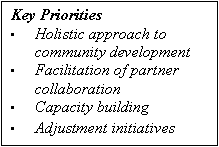 From time to time communities in Atlantic Canada face the need for sudden or phased adjustment to an economic shock such as the
fishery moratorium or significant lay-offs by a major employer. In these situations all levels of government must work
together to ameliorate the problem. Due to the Agency's broad economic development mandate, its established network, and
knowledge of the region, other departments and other levels of government often turn to ACOA. The challenge for the Agency
is to map out a realistic and responsive role in these situations. While the cause of the adjustment itself may not always
fall clearly within the Agency's mandate, there is usually an expectation that ACOA will play a major role in the response.
From time to time communities in Atlantic Canada face the need for sudden or phased adjustment to an economic shock such as the
fishery moratorium or significant lay-offs by a major employer. In these situations all levels of government must work
together to ameliorate the problem. Due to the Agency's broad economic development mandate, its established network, and
knowledge of the region, other departments and other levels of government often turn to ACOA. The challenge for the Agency
is to map out a realistic and responsive role in these situations. While the cause of the adjustment itself may not always
fall clearly within the Agency's mandate, there is usually an expectation that ACOA will play a major role in the response.
To achieve its community development vision, the Agency has identified four key priorities that will be the focus of its efforts in the coming year. These priorities are shown at right.
Policy, Advocacy and Co-ordination
As the federal agency responsible for economic development in Atlantic Canada, ACOA plays a lead role in identifying critical issues that need to be addressed in helping to foster economic opportunity, meet new economic challenges and bring forward actions and initiatives to see that these opportunities are realized and economic challenges are addressed.
The Agency's policy function exists to inform and support the decision-making of the Agency, the Minister, and the
government by providing intelligence, analysis, and well-grounded advice. It is carried out by means of internal and
external policy research on significant economic issues, through ongoing analysis of issues, trends, challenges and
opportunities facing the region, and through stakeholder engagement and consultative initiatives such as round tables and
conferences. A strong policy presence in the region is key to influencing national policy development.
In its advocacy role, the Agency works to influence national policies, programs and initiatives to reflect the interests of Atlantic Canada. The Agency's mandate also requires it to co-ordinate the policies and programs of the Government of Canada in relation to economic development.
Management Plans and Priorities
The Agency will continue to implement initiatives to strengthen its accountability and planning regime as follows:
- Improving the Agency's integrated planning process by better aligning resources to priorities. This in turn will enhance decision-making and lead to accomplishing better results for Atlantic Canadians. The Agency's planning approach will be based on the Program Activity Architecture;
- Ensuring that human resources (HR) planning is an important and integral component of the Agency's business planning process, thus ensuring that the best HR decisions are made to help achieve business goals and priorities;
- Strengthening the Agency's management control systems by implementing the new internal audit policy. In addition, a chief audit executive will be named, and within three years an internal audit committee will comprised of members from the private sector as well as from federal departments other than ACOA;
Human Resource Management
|
Agency FTEs by Fiscal Year |
||
|
2006-2007 |
2007-2008 |
2008-2009 |
|
612 |
592 |
592 |
ACOA has integrated its human resource planning into its business planning by including human resources as a formal, integral and mandatory part of the Agency planning process for fiscal year 2006-2007 and beyond. The Agency has established a Human Resources Planning Committee.
The integration has been fully implemented and is now part of the annual executive planning forum and the human resource
planning requirements are specifically included in the President's call letter for the preparation of operational plans. The
Human Resources Branch at Head Office has taken a functional leadership role in the human resource planning exercise and there
is a formal review, analysis and roll-up of all human resource plans each fiscal year.
Linking ACOA's Activities/Outcomes to the Government of Canada's Outcomes
The Government of Canada's annual report on performance entitled Canada's Performance 2005 focuses on three key policy areas – Sustainable Economy, Canada's Social Foundations, and Canada's Place in the World. In addition, the 2005 report includes a special chapter on Aboriginal Peoples.
The following table depicts the relationship between the Government of Canada's outcomes and ACOA's contribution toward them.
|
Government of Canada's Outcomes Canada's Performance 2005 |
ACOA's Response |
|
Economic |
|
|
An innovative and knowledge-based economy |
Enterprise Development |
|
Strong economic growth |
Enterprise Development Community Development Policy, Advocacy and Co-ordination Sustainable Development Strategy |
|
Income security and employment for Canadians |
Enterprise Development Community Development |
|
A fair and secure marketplace |
Enterprise Development : |
|
A clean and healthy environment |
Enterprise Development Community Development Sustainable Development Strategy |
|
Social |
|
|
A vibrant Canadian culture and heritage |
Community development : - Interdepartmental Partnership with the Official Language Communities - Memorandum of Understanding with Industry Canada -- Investment in Acadian and Francophone Youth |
|
Aboriginal Peoples |
Community D43evelopment |
To review the complete document Canada's Performance 2005 refer to:
http://www.tbs-sct.gc.ca/report/govrev/05/cp-rc-eng.asp.
ACOA 2006-2007 Program Activity Architecture
